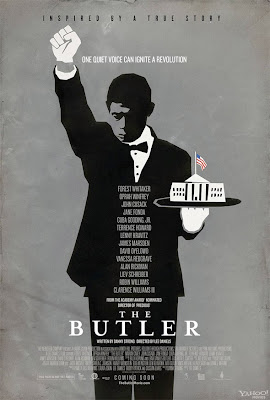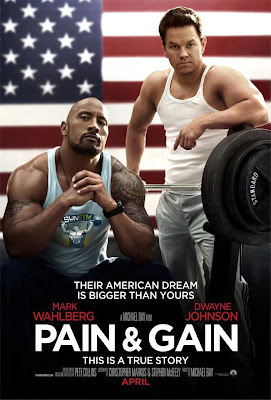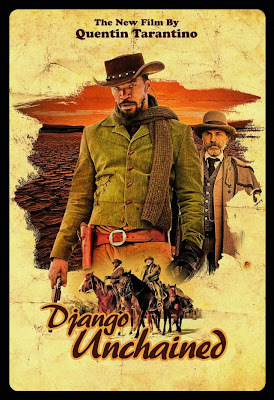‘Lee Daniels' The Butler’ Serves Some Great Material Along With Its Cheese
Lee
Daniels' The Butler: 3 ½ out of 5
Maynard: Are you political Mr. Gaines?
Cecil: No.
Maynard: Good. We have no tolerance for politics at the White House.
Cecil: No.
Maynard: Good. We have no tolerance for politics at the White House.
The
Butler is the kind of movie I would normally dread
watching, were I be one to base everything I see off of movie trailers or just
be a very cynical person in general.
Fortunately, I am not very cynical and am happy to give almost anything
a chance. Despite knowing that this
would be something like the black equivalent of Forest Gump, by having a lead character played the genuinely warm Forest
Whitaker and pushing him through various stages of history and the Civil Rights
Movement, I was indeed impressed by the large cast involved as well as the
nature of this story, which turned out to be just as much a strong father and
son tale, as well as a historical drama.
This also highlights an issue of the film, which is how it has plenty of
good intentions placed on too many stories, making it a bit too unfocused
overall, despite praise that can be put upon some performances and various
sections of the film.
Beginning in the 1920s
with a young man working on a cotton field in Georgia, only to see his father
murdered in front of his eyes, the film is quite clear from the forefront that
it will be tackling racism head on. This
young man is Cecil, who grows up into the form of Forest Whitaker and learns the
skills of serving over time. This
eventually leads to Cecil earning a job as a White House butler, where he will
spend 34 years of his life serving through several Presidential terms. During his tenure at the White House, Cecil
will also deal with his life as a family man, where he and his wife Gloria
(Oprah Winfrey), fight over Cecil’s balance of time at the two most important
houses in his life. There will also be
plenty of drama involving Cecil’s oldest son, Louis (David Oyelowo), who takes
the Civil Rights Movement head on, by involving himself in many of the more extreme
efforts in an attempt to tackle big issues of the nation. During all of this, Cecil is mostly content
to serve, but what he becomes witness to, over time, can certainly change a
man.
Right off the bat, I
have to commend the work of both Whitaker and Oyelowo. Regardless of the film’s flaws and how often
it may lean too heavily on what these characters, among the others, are
standing for, they both really deliver strong performances. Whitaker is an actor I am happy to embrace in
almost any role he goes for, as he knows how to play unassuming very well,
making it an effective surprise when he goes big every so often. Given his soft speaking voice playing against
his larger physical presence (though he is noticeably quite slim these days),
Whitaker has all he needs to make a sincere, yet confident leading actor, and
his role as Cecil in The Butler gives
him just the opportunity to do so once again.
There is a lot to read in just the eyes of Whitaker, as he deals with
the various people throughout his life and it becomes all the greater when you
can see how he handles the small victories that do come his way.
David Oyelowo, who has
been solid character actor to watch, excels greatly as well. While the film does manage to insert him into
a wide variety of protest acts that match up to actual historical events,
Oyelowo works well to show the conviction in him throughout. It becomes especially effective as he grows
older and the film works to make the estranged relationship with his father
more important. Based on the history
seen between the two men, it becomes very interesting to see how things
eventually shape out between them. While
the film is called The Butler and
certainly has plenty to work with from that angle, a film about Louis’
struggles during this time could have been just as interesting a focus.
I have mentioned the
huge cast already, but as far as historical figures go, we have: Robin Williams
as Eisenhower, James Marsden as JFK, Liev Schreiber as Lyndon B. Johnson, John
Cusack as Nixon, Alan Rickman as Reagan, Jane Fonda as Nancy Reagan, and Nelsan
Ellis as Martin Luther King, Jr. The
film also features Cuba Gooding, Jr. and Lenny Kravitz as White House servers,
Terrence Howard as a friend of Cecil and Gloria, and there are still plenty of
other actors I haven’t listed. All of
this is to say that the film is crowded with actors, but none of them
necessarily overdue it on their role, even when considering how jarring it is
to watch Alan Rickman play Ronal Reagan or Cusack tackle the Nixon voice.
There is one key
performance that is not necessarily too much, but simply not as necessary as
the film ends up making it, and that is from Oprah. I have nothing against Oprah and I think she
does her best with the material given (as unsubtle as director Lee Daniels may
be, he knows how to get good-to-great performances out his actors), but we
simply have a whole lot of her. It is
great that this film wants to acknowledge Gloria’s presence in Cecil’s life,
but this extends to the film’s problem overall – what is it really trying to
focus on? While I have nothing to back
this up with, it almost seems like Gloria was a less significant role until
Oprah signed up to play the part. With
Gloria factoring in so heavily, we add on familial issues, the hints of
alcoholism and adultery, and another section of characters to keep up with, to
a film that already wants us to explore racial politics in the White House and Louis’
struggles in the Civil Rights Movement.
These are weighty topics that this 132-minute film simply can’t balance
as well as it tries. At the same time, I
am happier that the film is as long as it is, rather than be a staunch, 150+
minute feature epic. I just wished there
was a bit more streamlining.
Interestingly, while
the film was directed by Lee Daniels, an acclaimed African-American director
who shot to higher acclaim following his work on 2009’s Precious, it was written by Danny Strong, the award-winning screenwriter
responsible for two acclaimed HBO films, Recount
and Game Change. While the Cecil character is fictional, the film
is based on a real life account of a black White House butler, which was
detailed in an article, but Strong has taken this material and turned it into a
film that is a bit more inspiring than it is inspired. I can commend this film for taking on
challenging subject matter and managing to provide a context that has you
feeling exactly the way it wants in certain scenes, but at the same time, The Butler is not doing a whole lot that
is new. We may not have seen this story
before, but we have seen this kind of story before and for all the work done by
the actors to make it work, the film tends to lean on the obvious beats a bit too
heavily at times.
With that said, the
film is also very secure with being a film told from the black
perspective. Having Lee Daniels serving
as director certainly makes this evident and while the film has its occasional
preachy moments, it never quite feels like it is completely catering to be a “fight-the-good-fight-and-overcome”
type film. While some white characters
are vilified (for just reasons) and the n-word is slung out there constantly,
the black characters are not all painted in pure saintly manners. In addition to the inherent style that comes
with the various time periods we watch these characters go through, we get to
watch them struggle based on personal issues and not just ones that deal with
the greater issue of Civil Rights. It is
a commendable aspect of a film that could have approached the scenario from a
different perspective and completely failed.
The Butler may have some
narrative confusion, but it does feel level-headed as to how to present its
characters.
Good intentions
certainly rule out overall, when it comes to The Butler. While the film
has its share of setbacks, it also has a couple very strong performances and
the help of many other actors that apparently wanted to be involved with the
project. While not directly based on a
true story, it is an interesting one to see unfold on screen. The concept is certainly sound and the film
managed to leave me not feeling one way or another about its awards
potential. Instead, I was happier to focus
on considering the smart moves it tried to make and why it worked better than
expected. It probably helps that the
film is moving, which can make up for many of the biggest flaws. Something as simple as Cecil finally treating
Gloria with a trip to the White House almost outweighs some of the terribly
obvious narration. It is these kinds of
moments that make The Butler a film
that can resonate in spite of itself.
Gloria: You know he got that job himself. The White House called him, he didn’t call
the White House.
Aaron
is a writer/reviewer for WhySoBlu.com. Follow him on Twitter @AaronsPS3.
He also co-hosts a podcast, Out Now with Aaron and Abe, available via iTunes or at HHWLOD.com.
He also co-hosts a podcast, Out Now with Aaron and Abe, available via iTunes or at HHWLOD.com.












Interesting review, I thought the initial trailers made "The Butler" look very melo-dramatic and very preachy. Like you said in your first paragraph, being cynical to these type of films is a huge problem for me too haha. But maybe I'll check it out now and a job well done with your review!
ReplyDelete